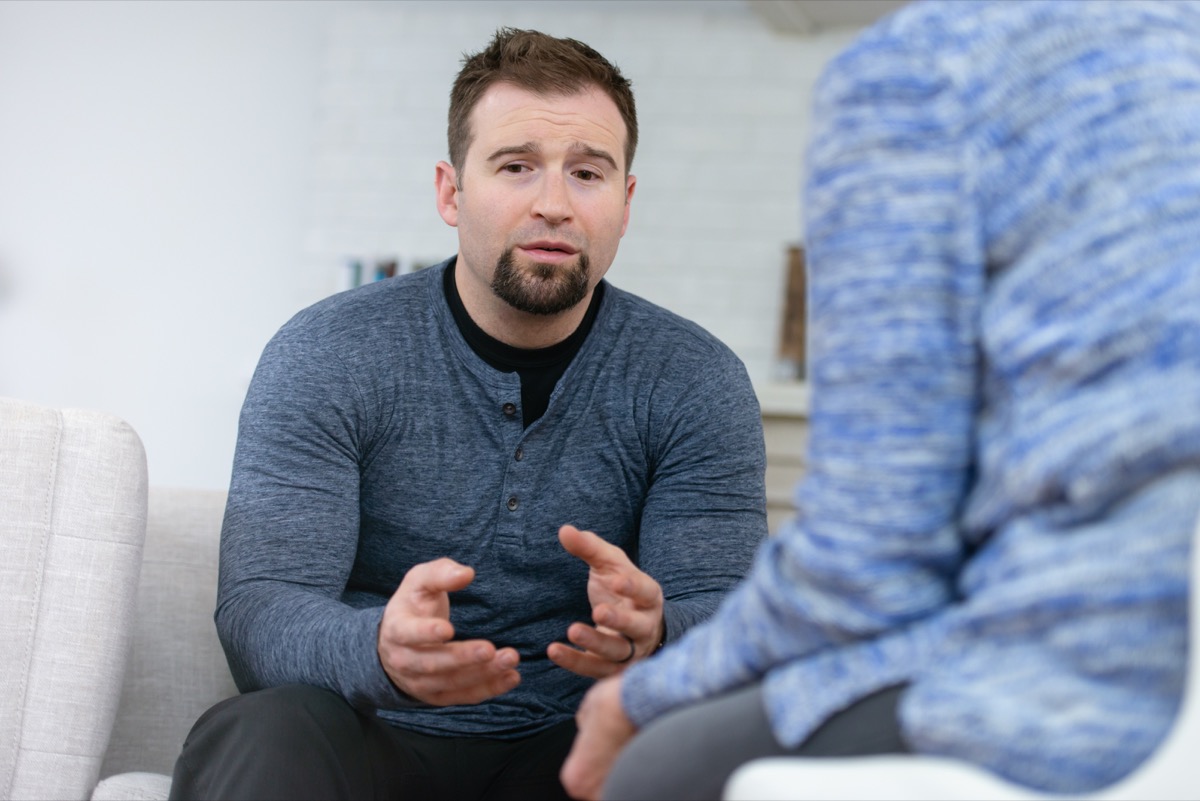5 Words That Will Make You Sound Less Confident, According to Experts
If you want to appear more self-assured, avoid using any of these words.

Word choice can affect many things, including the way people may perceive you. Some words can make you seem more intelligent, while others have the opposite effect. There are also words that are fine in some situations but troublesome in others. Research has even shown that word choice can play a part in your optimism, happiness, and confidence. It's not just about your own perception and word choice association either—in fact, some of the words you're using may affect how someone perceives your level of confidence. If you want to appear more self-assured, avoid these five words that will make you sound less confident to others. And for more words to avoid, Using These Words Instantly Makes You Sound Less Intelligent, Study Shows.
1
Unless

Psychotherapist and self-care coach Peg Sadie, MA, says that "anytime you add conditional and negative qualifier words to your statement you appear less confident in your message." One example of this she points to is the word "unless." She says when you make a definitive statement and then add the word "unless," you're basically watering down your message.
"It's a way of coming across as less threatening or more agreeable by heading off any potential conflict," she explains. "But, this can be a slippery slope, especially in a work environment where it could be perceived as a form of indecisiveness or weakness. It's become so ingrained in people's vocabulary that most probably don't even realize they're doing it and the impact it has on how people perceive them." And for tricks to make yourself more confident, try these 40 Ways to Boost Your Confidence.
2
Maybe

The word "maybe" is another qualifier word that "reduces the power of your statement," according to Lynell Ross, trained health and wellness coach and resource director for Test Prep Reviews.
"Either you know something to be true, or not," she says. "If you aren't sure of something, just say that you will find out. People respect those that tell the truth, even if they don't know the answer." And for more reasons you seem less confident, discover 17 Ways You're Destroying Your Confidence and Don't Know It.
3
Right

Many people end a statement by proposing the word "right" as a question. For instance, someone may say, "I think that I did well, right?" Adding that word at the end sounds "as if you're asking for validation," says Daniel J. Tortora, PhD, a book coach who helps writers express themselves and pitch their work. The word "right" used as a question makes it sound like "you don't know and want others to decide for you," which doesn't make you appear very confident. And for more words to steer clear of, This Is the One Word You Should Never Say to Yourself.
4
Actually

Ian Kelly, the vice president of operations for NuLeaf Naturals, reveals that the word "actually" undermines your perceived confidence in business situations. After all, he says, this word often implies that you don't have confidence that others will believe in your idea or statement. Omitting this word will usually make you "sound more confident and direct" when discussing business efforts. And for another word that's undermining you, This Is the One Word You Should Never Say When Apologizing.
5
Try

Many people misuse the word "try," says Karen R. Koenig, LCSW, a psychotherapist and author. Most of the time, they don't actually mean it. Someone may say "I'll try to do that" or "I've been trying to," even when they've being doing that thing or have done it already. They just don't want to seem definitive in their response, as that kind of definition can open up criticism from others. It typically makes that person seem as if they don't believe they've done something successfully or will be successful in what they're doing, Koenig says. And for more useful content delivered straight to your inbox, sign up for our daily newsletter.





















